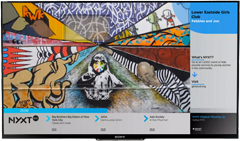During the current COVID-19 pandemic, we are all suffering from loneliness, sickness, stress, and vulnerability in one way or another. We've all suffered personally or felt worried about a loved one. Research has proven that social isolation has devastating effects, but that the power of social connection can be transformative. We recently spoke with Jan Lauren Greenfield, who works with DOROT, a nonprofit organization committed to building community. DOROT serves more than 3,500 older adults each year who are homebound, homeless or need to be connected to their greater community.

Image via dorotusa.org.
How did DOROT come to exist? Can you share a brief story about the organization?
In 1976, a group of recent graduates of Columbia University’s social work program noticed that many of their neighbors on the Upper West Side were older and lived alone. They wondered how they were faring, particularly in the cold winter months. The social workers began to interact with these older adults and quickly noticed a hunger for both food and social connection. They formed DOROT (which means Generations in Hebrew) 44 years ago. Since then, DOROT has become a leader in the fields of aging services and volunteerism.
What is the cultural background of the adults and families that DOROT supports?
Though DOROT has Jewish roots, DOROT serves and welcomes people of all faiths and cultures. Our programs – currently available in New York City and Westchester County – engage 10,000 seniors and volunteers annually. Social workers work with vulnerable older adults, addressing each person’s needs and interests. Volunteers of all ages engage with older adults, providing meaningful social connections.
During the COVID-19 Pandemic, many of our programs are being delivered virtually. Older adults now join free classes on many topics, ranging from wellness, to concerts, to life planning, from home – on the telephone or computer. We welcome volunteers from New York City and beyond for virtual connections.
DOROT volunteers show up for elderly adults to help maintain connections with them.
Jan Lauren Greenfield started as a volunteer at DOROT and has worked for the organization for just under two years in Marketing and Development. At DOROT she specializes in earned media, branded content, public relations, social media, and video production. She holds a Master’s Degree from Pratt Institute, a B.A. from Middlebury College, and is certified as a Yoga Teacher, Wilderness First Responder, and in Art Therapy modalities.
What societal problems is DOROT trying to solve? What are the main challenges while working with seniors?
Social isolation and loneliness are a growing public health crisis. Older adults are at a particular risk. Nearly half of U.S. adults report that they sometimes or always feel alone; 35% of older adults say they are socially isolated. Social isolation and loneliness are linked to adverse health consequences including depression, cognitive decline, poor cardiovascular function and impaired immunity and have a negative health impact on mortality equal to smoking 15 cigarettes a day. Research has proven that social isolation has devastating consequences. Social connection, on the other hand, can be transformative.
DOROT is a leader in designing innovative programs that improve the lives of older adults. Our vital, supportive services and opportunities build social connections with peers and with people of all ages. Our Friendly Visiting program builds relationships: 84% of older adults say they feel more socially connected, and 97% of volunteers say DOROT makes a positive difference in their lives. Our social workers provide vital services: 66% of older adults who use DOROT’s home-based services say that they have more resources to assist them with their needs.
We are in a new phase of the coronavirus pandemic here in New York. What are the next steps to help seniors in the city? What are the current protocols and indications?
DOROT continues to operate remotely and encourages every one of our volunteers and seniors to continue to stay apart but stay connected. We have made great strides adjusting to our new reality and modifying our programs. Home visits have become weekly calls, onsite classes have moved online, meals are being delivered to those who need them most and volunteers are stepping up. Our community is still connected and still growing. Through this experience, we’ve learned how to make powerful social connections for older adults via Zoom, and are even more aware of the fact that people depend on our programming. We successfully transitioned the Summer Teen and College Internship Programs and Rosh Hashana Package Delivery to virtual and other contactless formats because our community wants and needs these programs.
Does DOROT collaborate with other organizations?
DOROT has many long-lasting partnerships with nonprofits, city agencies, schools, and private sector companies. We are always looking to collaborate with other organizations. We are also excited about online collaborations with social media influencers who can help us reach new audiences.
Are you looking for volunteers? How can people get involved?
Yes! Whether it's a one-time event or volunteering on an ongoing basis, volunteers make a difference in the lives of older adults. People can learn more about safe and socially distant way to volunteer and make an impact here: dorotusa.org/volunteer-connect-older-adults.



